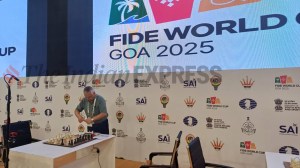Letters To The Editor
Caste crucible• PRADIPTA Choudhary in the last paragraph of his article, ‘Doesn’t help to typecaste’ (IE, May 29) write...

Caste crucible
• PRADIPTA Choudhary in the last paragraph of his article, ‘Doesn’t help to typecaste’ (IE, May 29) writes that Sainthwar has broken away from Kurmi. This is not correct and speaks of the writer’s ignorance. In the census exercises of 1911, 1921 and 1931, Sainthwars and Kurmis have each time been enumerated separately. Social sciences say that caste is formed either by fission or fusion of communities but the process is not spontaneous and takes long. The Sainthwar community was formed by fission from ancient Gan Jatiya Kshatriya in Buddha’s time, following decisions taken at a parliament-like forum called Sansthagar. The small population of Sainthwars had maintained its purity against odds and continues to do even today. It has been accepted by eminent historians like Rahul Sankrityayan, K.P. Jaiswal and Dr Raj Bali Pandey that Kshatriyas of Mall Mahajanpad still exist as Sainthwar-Kshatriyas and there is no connection with Kurmis, which did not exist in that ancient period. The community is not rich, rather it is depressed.
— C.P.N. Singh, Lucknow
Petro pressure
• COMMUNISTS say that petroleum price hike can be avoided by reducing custom duty. They should know that Center reduced excise duty twice, first by the NDA and next by the UPA government. Now it is the turn of states to reduce sales tax. Why is it a minimum of 20% all over India? They should force the Center to make law that ST on any item shall not exceed 10%. Murali Deora has said states should reduce the sales tax. Thankfully, some states have already started doing this. Now, Marxists should put more pressure.
— B.V. Rao, Bangalore
Searing analysis
• AJIT Doval’s article, ‘Way to defeat ourselves’ (IE, June 2), attempts to focus the reader’s attention on the threat a divided society could pose to the integrity and security of the nation, making it a soft target for the enemy to strike at will. The analysis is soul-searching for a statesman, but it will fall on deaf ears — for here, our politicians cannot see beyond their nose.
— Devender Khanna, Gurgaon
Insured to disclose
• THE Supreme Court ordering insurance companies to cough up mediclaim compensation in spite of non-disclosure of disease(s) may sound hearty but this practice is not in keeping with the important ‘principle of utmost good faith’ on the part of the insured. And it is this principle that gives ground to the ‘principle of indemnity’ on part of the insurer — the promise to compensate in case of loss. True, insurers try hard to avoid paying compensation by finding fault with the insured, but there is a part of the deal the insured fulfills.
— Abhishek Seth, Kolkata
Shadow boxing
• EXPECTEDLY, Mulayam Singh sees the hand of Congress chief, Sonia Gandhi, in the Supreme Court’s notice to him to furnish details of the last 5 years of the assets in his and his relatives’ names. His party has demanded that Sonia Gandhi also be asked to explain how she can justify her and her family’s lavish lifestyle while her declared sources of income are meager. Singh seems to believe offense is the best defense. By attacking her, he thinks he will persuade her into using her influence to drop the inquiry against him.
— R.J. Khurana, Bhopal





- 01
- 02
- 03
- 04
- 05


























